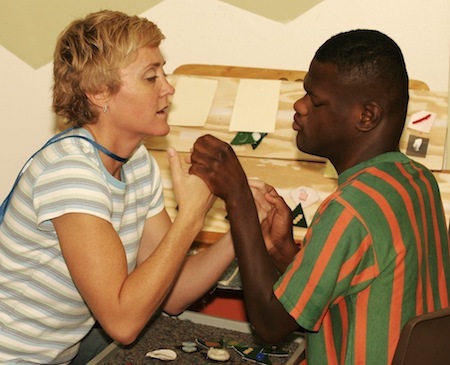Recommendation 5: Qualified Personnel
Ensure that students have access to qualified personnel at school and within adult service agencies.

Why This Is Important
To access competitive integrated employment and community living, students with deaf-blindness and additional disabilities need an individualized approach to determining their interests, abilities, and support needs. This requires personnel who:
- Are proficient in customized employment strategies
- Have knowledge and expertise regarding evidence-based practices in deaf-blindness
- Know how to support person-centered planning
Customized employment (CE), introduced in 2001 by the Office of Disability Employment Policy at the U.S. Department of Labor, is a process that takes into consideration each job seeker’s unique contributions and skills, as well as the conditions that must be in place for them to be successful in a work environment. It creates employment opportunities, rather than trying to force fit an individual into an existing position.
In addition to CE for job development, students with deaf-blindness and additional disabilities require ongoing assistance to ensure they: (a) have access to information about what is happening in their work environments, (b) can communicate with co-workers, and (c) are included socially.
In the past, these individuals have been overlooked for community employment due to the perception that they are unable to work “competitively.” Traditional assessments, which measure a job seeker’s readiness for employment without considering their ideal employment conditions, tend to highlight deficits that may result in the individual being denied access to competitive integrated employment services and even, at times, VR services.
The CE approach was included and defined in the Workforce Innovation and Opportunity Act (WIOA) in 2014. Since the passage of WIOA, all individuals who want to work in the community should be able to access CE through VR services. Not all states, however, have the necessary procedures in place.
What State Deaf-Blind Projects Can Do
1. Research what your state is doing to promote customized employment and competitive integrated employment.
Contact your state’s developmental disabilities, vocational rehabilitation, and blind and low vision agencies to find out about activities in which they are engaged that build the capacity of employment providers to offer CE. Partner with your Helen Keller National Center Regional Representative to explore ways to work together to provide technical assistance about deaf-blindness and how it impacts community employment.
VR departments in several states are receiving technical assistance from the Workforce Innovation TA Center (WINTAC) regarding the effective implementation of WIOA requirements. Other states have received TA from the Office of Disability Employment Policy’s Employment First State Leadership Mentoring Project to: (a) realign state policy to encourage Employment First, (b) restructure funding provided by VR and developmental disabilities agencies to incentivize competitive integrated employment over sheltered employment; and c) build the capacity of employment providers through professional development.
If your state is engaged in these types of efforts, make sure your project is at the table.
Resources:
- Changing Systems: Moving Beyond Child-Specific Technical Assistance
- Resources and Strategies for Competitive Integrated Employment
- ODEP’s Employment First State Leadership Mentoring Program
- NTACT competitive Integrated Employment Tool kit
2. Educate yourself about customized employment. Obtain training or work with other agencies to sponsor training.
Resources:
- The Essential Elements of Customized Employment
- The Essential Elements of Customized Employment for Universal Application
- Customized Employment
3. Contact NCDB for assistance regarding activities to influence systems in your state that cover transition services.
NCDB can support a range of systemic efforts that your project may be considering or attempting. These include exploring the agencies and organizations in your state involved in transition, planning systemic professional development activities, or working on interagency councils to ensure the needs of youth with deaf-blindness are addressed. If you are considering such work, contact NCDB to learn about the available types of support.
Promising Examples
Minnesota Vocational Rehabilitation Services
Minnesota VR Services is committed to building the capacity of their staff and contractors (community rehabilitation providers [CRPs]) to deliver quality customized employment services. They have invested in training, developed new standards for services and products, and revised their fee schedule to incentivize providers.
The agency has contracted with Marc Gold & Associates to provide training in customized employment across the state and are supporting VR and CRP staff to pursue certification in customized employment. They have designated certified vocational rehabilitation staff in each region to review the quality of products and services (e.g., assessment, discovery, job development) submitted by CRPs to ensure they comply with the newly established standards.
Pennsylvania Services
Pennsylvania’s VR and Department of Human Services Intellectual Disabilities Services require employment providers who offer customized employment as a VR vendor to be certified in CE either through Marc Gold & Associates or Griffin-Hammis Associates. The Arc of Pennsylvania has taken the lead on organizing Marc Gold & Associates training several times per year. Pennsylvania has had so many people complete certification in discovery that it now has its own pool of mentors to support additional personnel to attain certification.
